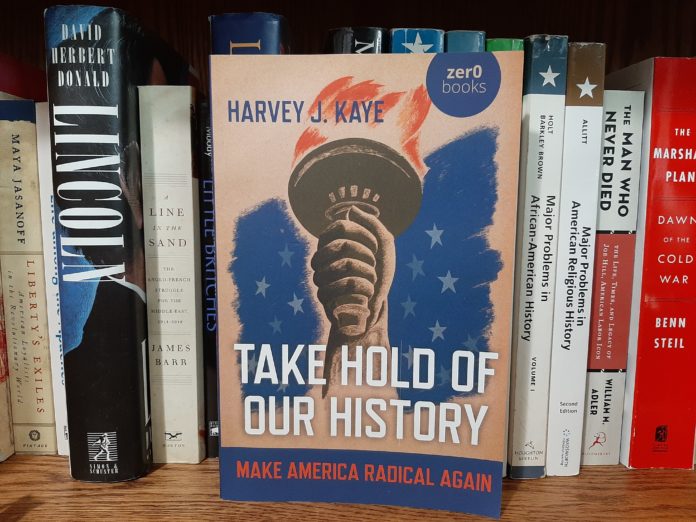In this wide-ranging conversation, Urbānitūs Associate Editor Robert Brehm and Professor Harvey J. Kaye thumb through the pages of Take Hold of Our History: Make America Radical Again. The book, a collection of Kaye’s speeches and essays, is author and historian Kaye’s manifesto to remember, redeem, and embrace the American radical story from the nation’s founding to the Emancipation Proclamation, the New Deal and the Civil Rights Movement.
Both history and the nature of collective memory are the focus of this discussion between editor Brehm and historian Kaye, professor of Democracy and Justice Studies at Wisconsin State University at Green Bay. Their theme is that while the right in America has abused history, rewriting America’s story over the past half century, the left has simply turned its back on history. America’s radical history, in fact, is the most powerful tool of progressives in this era, they conclude.
Kaye’s book can be purchased here.
Edited for clarity, a glimpse of their discussion:
Robert Brehm: Harvey, thank you for joining us. What is this book all about? What does it mean to take hold of our history?
Harvey J. Kaye: I’ve had this concern, this obsession almost, with the question of history and memory, especially because there’s that old Orwell line from 1984: “Who controls the past controls the future: who controls the present controls the past.” In the in the late 70s, into the early 80s, I was moving a lot between Britain and the United States, when Margaret Thatcher became the prime minister of Great Britain and Ronald Reagan became the president of the U.S. Both were really laying hold of their respective nation’s histories. What they did is they really did grab hold of a past that almost never existed, a kind of past which movies and television and storybooks presented.
But there was this real use and abuse of the past. And in Reagan’s case, he went all the way back to the American Revolution, to try to portray the founders as if they would have been antagonists for what had happened in American history between the 1930s and the 1960s. In other words, that the founders would be antagonistic towards the New Deal, and the Great Society of the of the 1960s.
The liberal/left side of the political spectrum — whether we are talking about liberals or progressives, or radicals — it was if they themselves who turned their back on the American story. In other words, instead of themselves articulating an understanding of American history, a story of struggle, of rebellion, of dissent. That was the way in which America was made, excuse the expression, greater along the way. Decidedly better than it had been. Revolution, the abolition of slavery, the enfranchisement of women, the empowerment of workers. That story, they seem to ignore, and thus much of what liberals and the left did.
Brehm: I want to talk about one figure in particular, which is Martin Luther King Jr. We’ve had some content on Urbānitūs recently on Martin Luther King Jr., his legacy and how people on the right and even Democrats have de-radicalized Martin Luther King. And you mentioned some of that in the book as well. Can you talk a little bit about that?
‘… King himself was a socialist, a democratic socialist. Maybe he would prefer the term Christian socialist, maybe prefer the term social democrat, but that is Martin Luther King Jr…’
Kaye: King himself felt this connection to the most revolutionary of the founders and had a real sense of history. The tragedy is, not only is he assassinated but his memory becomes sanitized of its radical, its social democratic, and its labor unionist initiatives. King did use the American story, the radical dimensions of it, to bolster his claims for racial equality and racial justice. Second, King was always reaching across to the labor movement. And there were African American unions. We shouldn’t forget A. Philip Randolph as probably the first and foremost of the Black civil rights leaders regarding labor.
The March on Washington was organized by Randolph and Bayard Rustin. It was underwritten in good part by the UAW (United Automobile Workers) by the president of the UAW, Walter Ruther, which enables a quarter of a million people to make their way to Washington, D.C. They invite King, who was not a part of the organizing effort, and of course King gives the iconic speech. But what we see here is this unity of civil rights and labor, which Randolph always pushed, and King himself took on as part of his struggles. Let us not forget that the march in Washington in 1963 was the March on Washington for Jobs and Freedom…”
King himself was a socialist, a democratic socialist. Maybe he would prefer the term Christian socialist, maybe prefer the term social democrat, but that is Martin Luther King Jr., and I think that we as progressives, do ourselves a real injustice if we don’t make a great deal of that … It is the case quite often that the mainstream media, mainstream politicians, they will sanitize King. The Republicans have exploited King in another way, acting as if King would not have embraced affirmative action.
Brehm: Something you mention in the book that maybe you would advise Bernie Sanders to do, is not point to Denmark and Scandinavia as he explains democratic socialism but instead point to American history. To FDR, MLK, and so on.
Kaye: Yeah. In the debates of this past spring, Bernie had every opportunity, literally to smack the likes of Klobuchar and Buttigieg, and Biden. He could have said to these Democrats – “What kind of Democrats are you? You’ve completely abandoned the greatest moment in the Democratic Party’s history.” The New Deal, FDR, Social Security, the National Labor Relations Act. He could have added when FDR proposed Social Security, the plan was to initially include national health care.
Bernie Sanders, in November of 2015, during the primary season, the first run he made for the president, he tried to explain to Americans in the speech at Georgetown University, what democratic socialism was all about. He reached not only to FDR, but he reached also to Martin Luther King, Jr.
In 1944, when Franklin Roosevelt gives the State of the Union address in which included a call for the creation of an “Economic Bill of Rights,” he included guaranteed health care for all Americans. Why did he do this? He was not fantasizing this as a possibility. He knew from a public opinion survey that the White House itself had commissioned, that 85 percent of Americans wanted national health care. All Bernie would have had to do when they “say you’re going to bankrupt the country”, is call Franklin Roosevelt into the room.
Brehm: Why do you think the Democrats are not taking advantage of the radical tradition of the United States?
‘… Look, Liberals have been running scared, probably ever since 1972, when McGovern got walloped by Nixon in the presidential campaign…’
Kaye: There is a tendency on the Left to focus on erasing the ugliest aspects of the American story, which often elicits a strong Conservative response, and the answer on the Left has been to lay out the tragedies and ironies, the exploitation, the oppression, and the truly sort of worst dimensions of the American story. And we see the ghosts of these tragedies too often reemerge, most recently sparking the massive protests out of the imperative of black culture, Black Lives Matter…”
Okay, so we have done an inadequate job in telling the radical story that is America. It is that conservatives love to promote the fact that we are very good, on the left of promoting the sort of nightmarish elements in the American story. Look, Liberals have been running scared, probably ever since 1972, when McGovern got walloped by Nixon in the presidential campaign. They say to themselves – “I don’t want to talk about Jefferson. I do not want to mention Lincoln. I do not want to mention Roosevelt, because somebody is going to say, “but what about?” In other words, a kind of fear sets in.
Brehm: How do you use Thomas Jefferson in this environment? How do you use FDR? When the follow up is often “what about their harmful aspects”?
Kaye: I would not necessarily go around celebrating Thomas Jefferson himself, strategically speaking. But I sure as hell would never want any progressive politician to fail to cite the promise of “life, liberty and the pursuit of happiness.”
.
I will tell you what everyone says about Roosevelt. Whatever his faults and failings were, he was definitely a man of the left, very much a progressive. We can fault him. Look, I mean, he left the American military segregated during World War II, he ordered the internment of West Coast Japanese Americans; we know the sins for which he will always have to answer to history. But it is also the case that this is a very, very progressive, and indeed, in many ways, radical American president.
We have to create a broad left, not only for the sake of winning elections, and giving ourselves a chance to overcome the utterly despicable administration that we are enduring right now. We also have to cultivate a narrative, because as you know, if we’re going to try to create a future we’re going to have to have basically articulate a past, a story that makes history-making worthwhile…”
Brehm: Donald Trump now, in a sort of a way that Reagan did, is… I do not want to say they are using history because they are really what they are using is mythology, of Make America Great Again.
Kaye: If you did not just say it, Trump literally plagiarizes Reagan with Make America Great Again. Those were actually Reagan’s words.
Brehm: Right, how is that successful? That abuse of history or that abuse of mythology? How Is it okay to put Andrew Jackson on the Oval Office wall, as the left has struggled so much to call these historical figures into the room?
Kaye: Andrew Jackson was something of a proto populist when he was president for certain white interests. One could see the degree to which Donald Trump is emulating the Andrew Jackson story. And let us not forget, for so much American history, Andrew Jackson is portrayed in almost heroic terms for the Battle of New Orleans, which took place after the war is over.
It would be easy for me to say, let us start mythologizing the past. But my thinking is we do not have to mythologize it. The past is ours on the Left. Look, into Thomas Paine and his Common Sense. The American Revolution, is already underway, but it’s not until Common Sense appears that it goes from being a defense of the rights of British subjects in America to being a war, not simply for independence, but for the creation of a democratic republic. When Paine talks to Americans about the imperative of declaring their independence, he first talks to them about democracy, talks about the imposition of the British government, and talks about the lunacy of monarchy and aristocracy.
Paine is essentially saying we have to fight for human rights for universal rights. So, I mean, the past is on our side in that respect.
Brehm: And you mention Lincoln a lot in the book, the president who brought an end to slavery. But he only lived one year into his second term, and he never got to live to see Reconstruction or comment on it.
Kaye: There’s this cohort of historians who would like to cancel out Lincoln. But Lincoln is not only someone who hated slavery. I know he was willing to talk colonization, but he backed off and he saw things utterly differently when Black slaves were in mass leaving their plantations and running to the Union lines seeking to serve as laborers and as soldiers. Lincoln was empowered at that point to sign and issue the Emancipation Proclamation.
Here is one other beautiful thing about Lincoln, he was, in many ways, our first social democratic president. He signs into law in 1862, not only the Morrill Act, which is the land grant act. That is the law that provided federal lands to states to convert into resources to create state universities. So that working people, whether they were in rural or urban areas, could go to university and not have to worry about paying the fees of a private college.
Every state in the United States, not only the ones that were there in 1862, but even in Alaska, now have land grant universities. I went to one as an undergraduate, Rutgers University in New Jersey. Here in Wisconsin, I teach and one of the campuses of the land grant institution.
Lincoln wanted to build America. And he understood that building America required ending slavery and empowering all working people to make something of themselves. Life, liberty, and the pursuit of happiness is there in Lincoln’s mind, as it was in Roosevelt’s mind. It was not simply the liberty of the founders. I mean, if American democracy is going to be stuck in 1776, then we would still have slavery. But the point is American democracy just as much as American capitalism is a growth experience… as FDR once said himself, democracy is not static.”
Brehm: I think my favorite quote from your book, which you gave during a speech at the Four Freedoms Park in New York City in 2014. Your quote was, “The only way to truly defend, secure and sustain American democratic life is to progressively enhance it.” So how do we progressively enhance our democracy?
‘… There’s a radical democratic imperative in American life, that the powers that be have always sought to suppress or to contain, and there are times when it just explodes. The question, is to what degree is it going to explode..?’
Kaye: Howard Zinn would say, “you can’t stand still on a moving train.” Okay. Well, it is like that with democracy. Hamilton or somebody in the Revolution said, or the Constitutional Period said, the United States is a grand experiment in democracy and think about what an experiment entails. An experiment entails testing the limits and pushing the limits. So, if democracy is to survive, we need to enhance it, we need to extend and deepen it as much as we can in every generation…”
The subtitle of the book is Make America Radical Again. I think Americans were turned into radicals by Thomas Paine in 1776. And I think there is a radical democratic imperative in American life, that the powers that be have always sought to suppress or to contain, and there are times when it just explodes. The question, is to what degree is it going to explode? Let us turn it in a truly progressive democratic direction.
Let me give you three moments in American history which really proved my point, I believe, 1776, the 1860s, the 1930s and 1940s… If there was anything that was going to be an American experiment, it was in mortal danger in the 1770s, in mortal danger in the 1860s, in a mortal danger in both the 1930s and 40s. Would there be a United States? The Civil War – Would the Union be sustained? Would the United States have lived up to its promise or not? In the 1930s the worst economic and social catastrophe in American history, maybe in global history, and then the 1940s, the fascism that emerges in Europe and in East Asia. There was no guarantee America and its allies would win the war.
It is the case that when Americans have confronted mortal crises, they have been lucky. Washington, Lincoln, and Franklin Roosevelt. But it is also the case that Americans have risen up and transformed the United States in radical ways during these crises. And that is where we are today. The pandemic is the poisonous cherry on top of 45 years of that class war in which we have created an inequality, that if it is not exactly the same, is worse than the Gilded Age of the late 19th century. The challenges are before us.
Brehm: How important is this moment, this 2020 election, this choice of Trump and Biden in particular?
Kaye: I have gone through enough elections where I have heard people say, “All of history hangs on this election.” But today, if you can see the depths of despair that we are in, politically speaking, but not fail to see the degree to which Americans themselves want to liberate themselves from the scourge, the best proof of which, is the Black Lives Matter movement. It is the fact that these were the largest set of demonstrations in American history. It was decidedly multiracial. Everyone was out there. It showed the degree to which young people in particular were saying the future is at stake. We are going to try to make history.
The election is fundamental. The presidential executive orders from the very beginning that this monster of a president has issued. Think about the fact that he has literally surrounded himself with people who are prepared to break the law, pursue the most corrupt practices, in order to sustain this administration, and cushion the nest for themselves after the administration, which they hope will not be next year, but four years away. Moreover, a president who has absolutely no concern for trampling on the Constitution, and is empowered by an attorney general who has little concern for a constitution and a Republican Party, which will go down in history as one of the vilest political forces in American history.
Brehm: I want to end with talking about where you live, in Wisconsin. What is happening there in the lead up to the election? When we spoke privately a couple weeks ago, you mentioned some things you noticed last time, that gave you some warning signs of the result in that state, which was that Hillary could not last. What are you seeing this time?
Kaye: What I am seeing this time is the fact that whether it is the state legislature, or the Supreme Court of the State of Wisconsin, which is I am going to say is right wing Republican dominated. We are seeing effort upon effort to suppress the vote to make this election a scary affair. Okay, in some ways, to make sure that not only Republicans win, but that that Donald Trump, whether he actually wins the state or not, will be able to fight legal battles to try to keep himself in the White House.
If the polls are all true, then it is fairly clear that once again, the majority of Wisconsinites do not care for Donald Trump. And last time, he won the popular vote. But it is also the case that the Democrats just plain blew it. The point is that the Democrats could still blow it. Hillary did not campaign effectively in Michigan and did not campaign at all in Wisconsin. She not only failed to offer an agenda, and a vision that might appeal to the majority of working people in the state. She also failed to come and remind African Americans in Milwaukee and elsewhere that “I need your votes. Period.”
It requires more than just showing up. Right now, the Democrats are not offering an inspired vision or platform. Fighting for the soul of America may sound like good sound bite, but it is just not going to motivate people. Right now, in Wisconsin, if right wingers have their way, people may well have trouble casting their mail-in ballots, and even a bigger problem showing up to vote given the possibility that we could see the beginnings of a second wave of the pandemic…”
Join us on the Urbanitus Facebook page to catch future conversations!
If you like what you’ve been reading, please click here to subscribe and we will send you updates and our newsletter.




